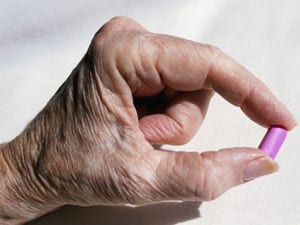
WEDNESDAY, March 14, 2018 (HealthDay News) — Long-term use of acid-blocking heartburn drugs, such as Nexium and Prilosec, does not increase the risk for hip fractures in people with Alzheimer’s disease, a new study finds.
These medications belong to a class of drugs called proton pump inhibitors (PPIs), which are often given to elderly people. However, some previous studies have suggested that extended use of PPIs may increase the risk of hip fractures.
In this study, University of Eastern Finland researchers analyzed data from more than 24,000 people in Finland who were diagnosed with Alzheimer’s disease from 2005 to 2011. The patients averaged 84 years old, and more than 4,800 of them had fractured a hip.
After accounting for various hip fracture risk factors — such as osteoporosis, medications and health conditions that might cause falls — the researchers found a slightly increased risk for hip fracture when PPIs were used for less than a year.
However, there was no increased risk for hip fracture with long-term or cumulative use over 10 years. The study also found no link between different types of PPIs and hip fracture risk.
The study, by Sanna Torvinen-Kiiskinen and colleagues, was published online March 6 in the journal Alimentary Pharmacology & Therapeutics.
More information
The U.S. National Library of Medicine has more on proton pump inhibitors.
